
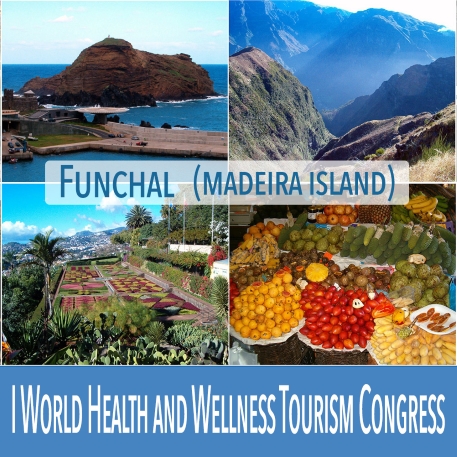
“It’s Almost Too Late.” ICTP President to World Health Tourism Congress
In a strong keynote address to Tourism Experts, Doctors and Students gathered on the Portuguese Island of Madeira, Professor Geoffrey Lipman Co-Founder of SUNx – the Strong Universal Network said that the industry is running out of time to craft a meaningful response to the existential challenge of Climate Change.
He said that “Health Tourism – nature and medically linked – may well be in a sweet-spot of tourism growth, at more than 10% a year… but without a climate resilience strategy it will be equally vulnerable to the ravages of extreme weather and the consequences in terms of floods, fires, droughts and climate refugees”.
Lipman pointed to the heat patterns in the Northern hemisphere, the droughts in Australia, the typhoons in Japan and Philippines– as well as last year’s devastating Caribbean Hurricanes and this years’ US floods and forest fires.
He noted that “in the past decade more than 20 million climate refugees had already emerged – this is the tip of a humanly tragic and politically disruptive iceberg”. It will only worsen as we head towards 3o – which is where we will be in 2050 if we don’t make radical behavioural changes. As a leading sector Tourism must be in the forefront of those changes.
Lipman profiled the SUNx network to galvanise tourism destinations and to link the enormous body of research being done at Universities around the world, as well as the data and analytics from committed organizations inside and outside the Travel and Tourism sector.
SUNx has developed a framework for Climate Resilience and Innovation Centres in every country by 2030 – supporting Paris Climate Accord targets and linked to SDG 13. They will be pop up SUN Arks, cloud connected and filled with young bright climate champions, talking to each other about “Smart Impact-Travel” solutions. He defined these as “Travel & Tourism planning that’s measured to manage: green to grow: 2050 proof to innovate. Not so much detailed, definition-based programs but more a direction for change that every travel product needs to reflect, and every travel company or community needs to embrace.”
He also outlined SUNx lifetime learning approach with a Dodo cartoon series for kids, online University courses, a universal portal, focusing the most useful climate data analytics, and Strong Legacy Scholarships for graduates. The first of these will launch in 2019 in collaboration with t-Forum and the IRiSS the Italian Services Research Centre. This is complemented by an annual Climate SmART Award for Museums, as the ultimate learning centres.
Finally, he discussed the partnership project with TraNeXus, designed to bring Blockchain solutions to provide carbon accounts for travellers, which he believes will be needed as the Paris Climate Accords bite in the next decade and we will all have to deliver low carbon lifestyles.
SUNx will reach out to Communities and Corporations to help develop its Climate Resilience and Innovation System and build open links with likeminded Travel & Tourism organizations
Quoting Maurice Strong he said “the planet will survive as it has done for billions of years. It’s the people we have to worry about” He concluded with the Club of Rome’s call for action “Come On – It’s almost too late. …. but we can fix the problem if we act together, now.
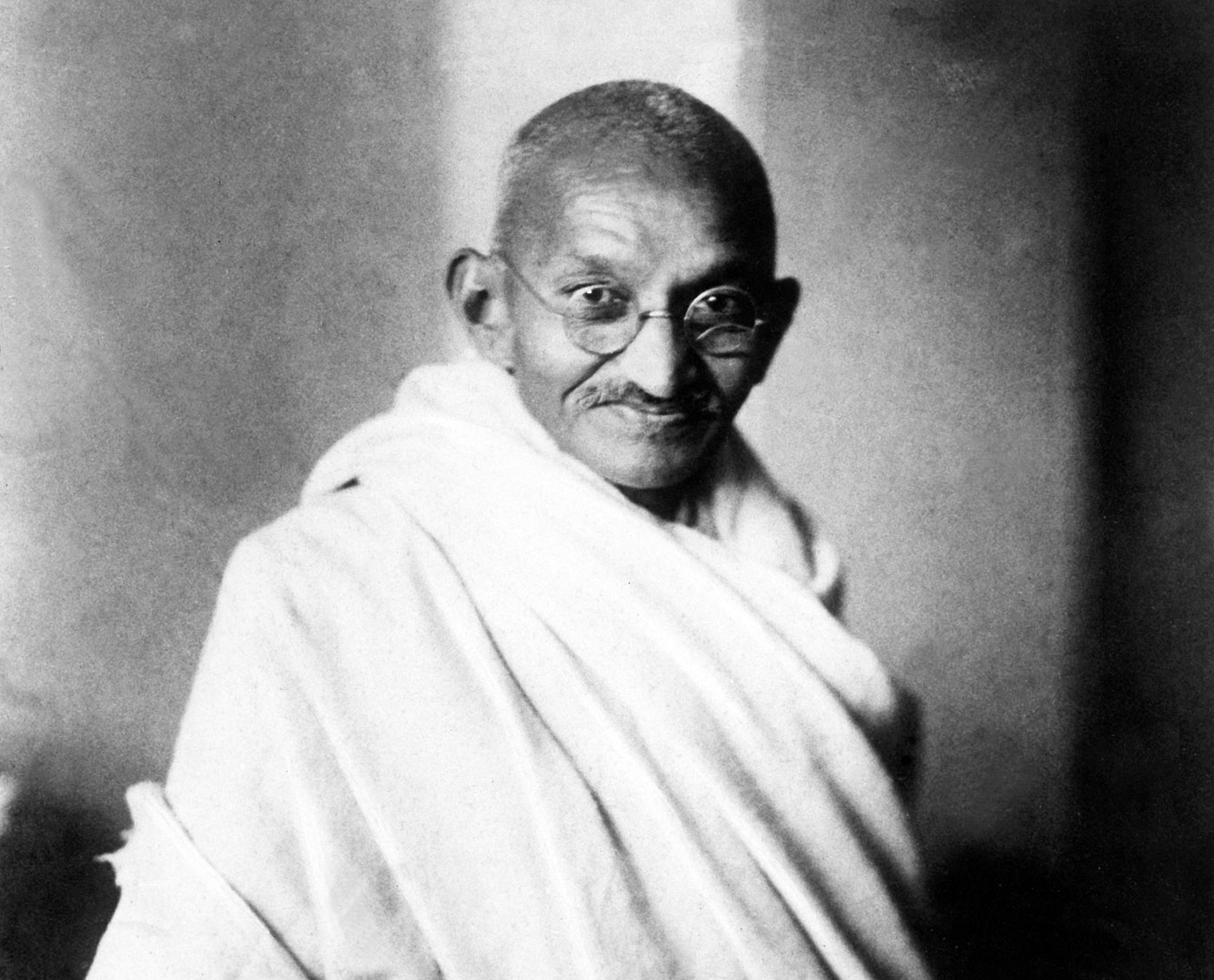
International Day of Non-Violence at UN explores tolerance and understanding
Prestigious statesman, peace activists, and highly-acclaimed leaders gathered in New York earlier today to commemorate the anniversary of Indian activist, Mahatma Gandhi’s birth. Internationally recognized as “Non-Violence Day,” the United Nations played host to a day of discussions around the future of conflict-resolution and ways to improve tolerance and understanding in the modern world.
The impact of technology was an important theme. While access to the Internet has been found to foster improved positivity, increased awareness and acceptance of other cultures, questions remain about its role in spreading intolerance.
Gianpiero Lotito, Founder and CEO of Italy’s highest-valued technology business, the European Search platform FacilityLive, explored how digital technology can help peace processes.
Gianpiero Lotito commented: “Technology enables us to protect against threats. Thanks to technology, we are able to fight terrorism, cyberterrorism, digital warfare and physical war to protect people. But, paradoxically, technology also creates these threats.”
The topics explored at the inaugural ‘Non-violence in Action’ meeting have become more significant in recent years in light of the increasing prevalence of extreme ideologies, violence, terrorism and armed conflicts. As the first non-governmental and non-political Italian invited to give a speech at the United Nations in more than 20 years, Gianpiero shared a vision for a more united Europe.
Gianpiero continued: “The combination of technology and peace is so important. That’s why working on a more human, more inclusive and less worrying technology becomes a mission. We don’t know if the future memory of humanity will be preserved by digital libraries as it was for those printed on paper.
“We need to be careful: if we transfer the world’s collective memory only in a digital format, we don’t know today what the long-term effects of this paradigm shift will be. We cannot risk discovering in two hundred years’ time that we were wrong about technology’s ability to preserve information, and that we left a hole in the memory of humanity. Only by returning to a more ethical, more human and more useful dimension of technology, will we respect our mission as technologists, people of peace, and humans.
“My generation has destroyed the dreams of some of the younger generations. I believe that it should be our mission to give them back the dreams that our parents and our grandparents, who lived during times of war, offered us. They had the desire to give their children and grandchildren the opportunity to live in a better world, a world of peace.”
Other speakers at the event included:
• Ms. Maria Fernanda Espinosa Garces, President of the UN General Assembly
• Mr. Achim Steiner, United Nations Development Program (UNDP) Administrator
• Ms. Jan Beagle, UN Under-secretary General
• Ambassador Tanmaya Lai, Permanent Representative of India to the UN
• Mr. Michael Nagler, Founder and President of The Metta Center
• Mr. Johan Ernst Nilson, from the Non-Violence Project Foundation
• Ms. Navina Haidar, Curator of the Department of Islamic Art at the MET
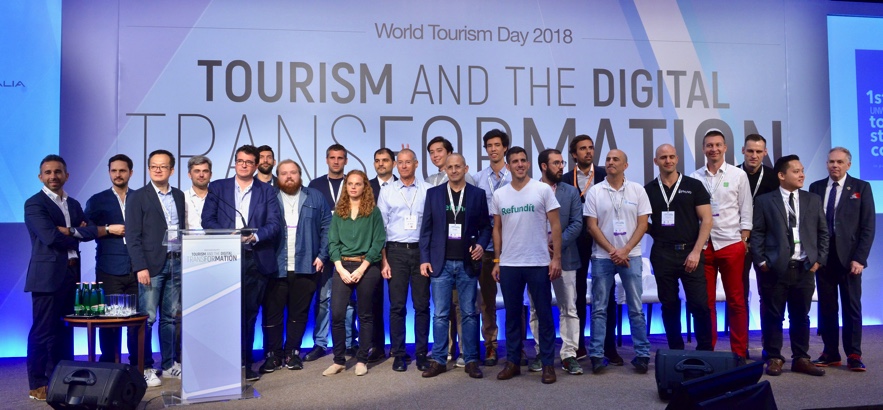
Digital transformation & innovation take spotlight on World Tourism Day 2018
Madrid, Spain, 28 September 2018 – World Tourism Day 2018 was observed in Budapest, Hungary yesterday (27 September 2018) with the official celebration focusing on the digital transformation in tourism, a World Tourism Organization (UNWTO) priority. The event examined how investment in new technology provides the sector with opportunities for innovation.
Introducing a new seminar-based format, the official celebration provided crucial insights into the actors and initiatives leading the digital transformation of the tourism sector and aimed at providing participants with concrete and actionable objectives to take away.
During the official celebration, the 20 semi-finalists of the 1st UNWTO Tourism Startup Competition gave pitches to investors and tourism leaders of their innovative projects with potential to disrupt the sector. They were selected from over 3000 applicants from 132 countries. The competition was launched by UNWTO and Spanish tourism leader Globalia to find projects that harness innovation and can change the way we travel.
“UNWTO is proud to have positioned, for the first time, tourism in the global innovation agenda – where it deserves to be because of its economic weight and importance. This is only possible by bringing the private and public sectors together in a meaningful way, and providing opportunities to share ideas, like we have done today”, said UNWTO Secretary-General Zurab Pololikashvili to conclude the event.
Mr. Pololikashvili was joined for the opening ceremony by Hungary’s Minister of State for Parliamentary Affairs Csaba Domotor and Gloria Guevara, President and CEO of the World Travel and Tourism Council, who emphasized the role of technological solutions such as biometric data capture in ensuring safe, seamless and sustainable travel.
Key amongst the conference conclusions was that political support is central to putting tourism at the centre of the global innovation and digital agenda. The event harboured this sentiment, attracting the participation of ministers from several countries and high-level political representatives at all levels of government, from local to national, as well as tourism’s main entrepreneurs, investors and innovators.
Other World Tourism Day celebrations also took place worldwide today, helping to mark the 38th year the observance day that has taken place to give visibility to the tourism sector’s role in international economic growth and development.
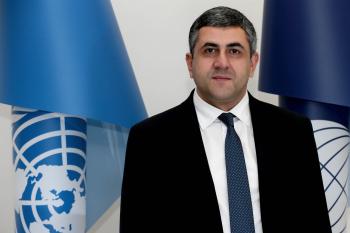
UN Secretary General has a message to the world on World Tourism Day
In his message for the Day, Secretary-General António Guterres said the wide reach of tourism into many sectors, from infrastructure and energy to transport and sanitation, and its huge impact on job creation, make it a vital contributor to the 2030 Agenda for Sustainable Development. At the same time, tourism plays a “pivotal” role in advancing the cultural understanding and bringing people together.
The United Nations is marking this year’s World Tourism Day by exploring how technological advances such as big data, artificial intelligence and digital platforms can contribute to the way people travel and foster innovation in the tourism industry.
“Yet tourism needs innovation in technology to realize its potential contributions,” the Secretary-General added, adding that its benefits need to flow to host communities.
“On World Tourism Day, I call on governments to support digital technologies that can transform the way we travel, reduce the environmental burden of tourism and bring the benefits of tourism to all.”
“The digital transformation is about providing benefits to all, and we are making sure that tourism contributes to this global commitment,” said Zurab Pololikashvili, Secretary-General of the World Tourism Organization (UNWTO).
Tourism has become one of the fastest growing and most important economic sectors in the world, according to the Madrid-based World Tourism Organization UNWTO, with international tourist arrivals having grown from 25 million in 1950 to nearly 1.3 billion today. The sector represents an estimated 10 per cent of the world’s Gross Domestic Product (GDP) and 1 in 10 jobs globally.
UNWTO expects that tourism will continue to grow at an average of 3 per cent annually until 2030, as more people have access to travel thanks to the decline in the price of transport, especially air transport, and growing middle classes worldwide.
The digital transformation is about providing benefits to all, and we are making sure that tourism contributes to this global commitment,” said Zurab Pololikashvili, Secretary-General of the World Tourism Organization (UNWTO).

Message from Grenada’s Minister for Tourism and civil aviation
It is my pleasure to address the nation on the occasion of World Tourism Day under the theme “Tourism and the Digital Transformation.” Over the past decade or so we have seen rapid increase in the use of technology in all areas of our lives. Technological advances have led to improvement in areas such as science, medicine, commerce and agriculture. Digital communications and social media have changed the availability and use of information and have served to connect the world in ways previously unseen – our world has become a “global village”. This use of technology and the digital transformation we are witnessing is also leaving its imprint on the tourism industry, a growing and dynamic industry on which, Grenada is highly dependent.
It is now not only possible but widely used, to book experiences without human contact through one’s computer or smartphone. In fact, you can experience a destination or product via virtual or augmented reality without even physically setting foot at the location. Additionally, some organizations are already considering the integration of Artificial Intelligence into their business models.
A digitally transformed tourism sector can improve entrepreneurship, empower local communities, promote the efficient management of resources as well as increase the market share and visibility of any destination. As a nation, we need to better understand the growing economic, societal and environmental impacts of technology and innovation in tourism if the local industry is to enjoy sustained growth. In fact, not only must we understand, but we must engage the use of all available technologies to promote our tourism, to maintain and improve our sustainable practices and to ensure that the industry brings benefits to all our people for an extended time.
I believe there are innovative ideas right here in Pure Grenada, Carriacou and Petite Martinique that are capable of revolutionizing the way our citizens and visitors experience all that this destination has to offer. I encourage citizens to give voice to these ideas. I also wish to encourage tourism enterprises to ensure that they keep abreast of the use of digital transformation to remain competitive. At the destination marketing level, my ministry along with the Grenada Tourism Authority will continue to lead the charge in further tapping into the opportunities provided by digital platforms and technology to ensure the world discovers, explores and shares Pure Grenada, the Spice of the Caribbean.
As citizens, we also have a number of digital social media platforms at our fingertips, including Facebook and Instagram which we know so well. I urge you to use them to share positive experiences about our country with the world, encouraging all to #FollowGrenada. We must pay attention to what we share, knowing that we are sending messages to the world and we need only our best to be seen and experienced. In Grenada, the Tourism industry provides direct and indirect employment for approx. 11,000 people and visitor spend pumps millions into our local economy.
Let’s work together to ensure that these benefits continue for future generations.
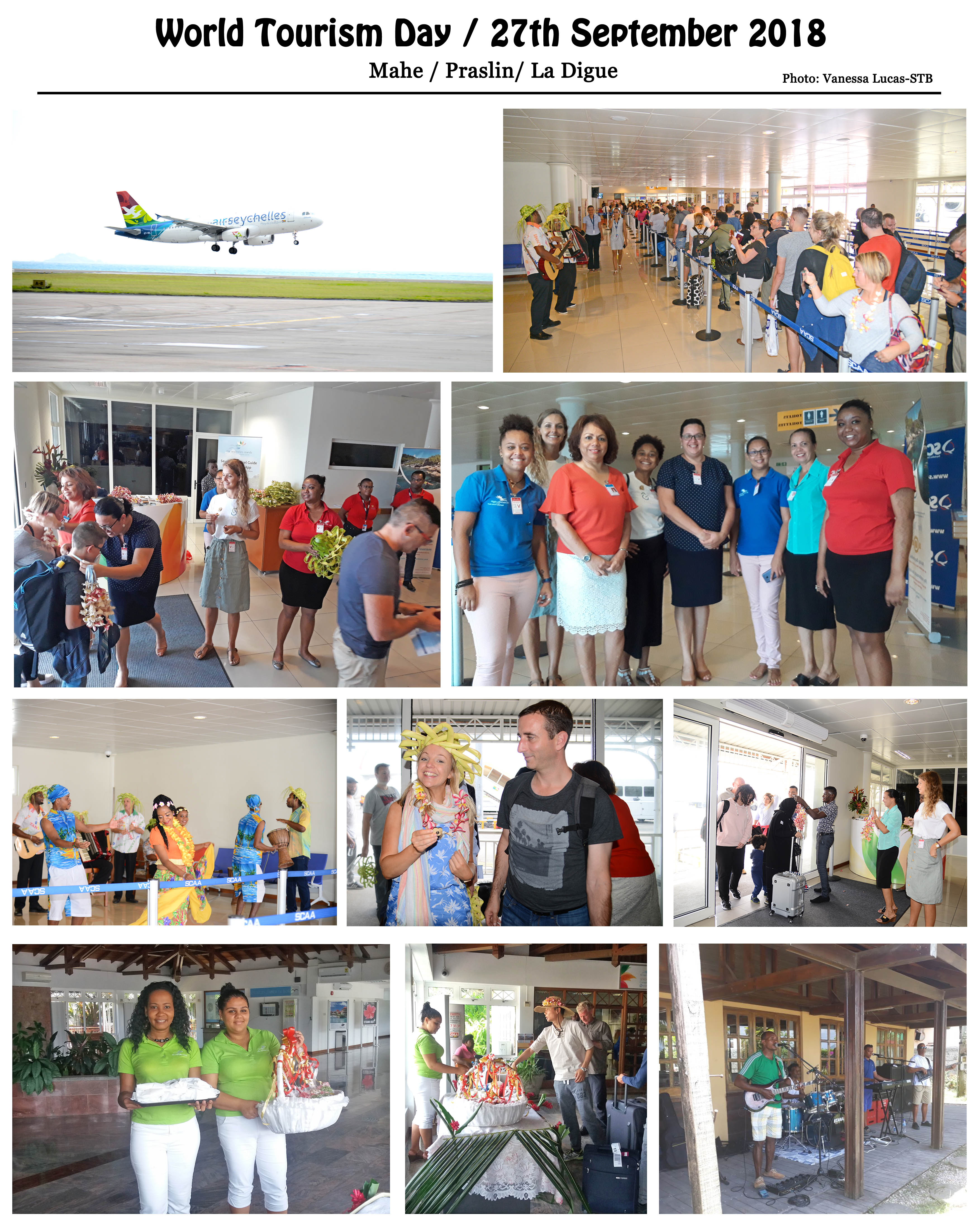
Sustainability key element of the activities to mark the World Tourism Day
The Seychelles International airport, the Praslin Airport and the La Digue Tourism Office near the Jetty witnessed the effervescence of a beehive this Thursday September 2018 as Seychelles joins the world to mark the celebrations of the World Tourism Day.
A series of activities coordinated by the Seychelles Tourism Board (STB) offices have been organised for the day on the three main arrival points of the different Islands.
Visitors disembarking on the Seychelles Shores have been treated to a warm welcome with traditional live music imbued of Creole touch.
On Mahé, the activities undertaken by the STB were conducted in conjunction with the Department for Tourism, the Seychelles Sustainable Tourism Foundation (SSTF), the Seychelles Hospitality and Tourism Association (SHTA) and the Seychelles Civil Aviation Authority (SCAA).
The customary welcome treat to passengers disembarking was honoured by the presence of Principal Secretary for Tourism; Mrs. Anne Lafortune and STB Deputy Chief Executive; Ms. Jenifer Sinon and Director for Trade & Visitor Services Section; Ms. Selma Magnan.
Commenting on the day’s special welcome event, Ms. Jenifer Sinon, STB Deputy Chief Executive mentioned STB’s commitment to make the celebrations meaningful by not only greeting our guests but also showing the industry’s pledge to making Seychelles a sustainable destination.
“The World Tourism Day is a day for us all to reflect on how to keep our destination relevant not only in providing the best services but also in contributing towards a greener Seychelles,” said Ms. Sinon.
The delegation was accompanied by members from the STB Trade and Visitor’s Services Section, Digital Marketing and News Bureau team, SSTF representatives Diana Körner and Rosetta Alcindor and finally the SCAA PR team, Customer Service officers and Social Media Specialist.
The meaning of the annual commemoration was heightened with the implementation of the ecological campaign Pristine Seychelles. The campaign spearheaded by the SSTF, is a call to all tourism stakeholders to promote the three pillars of sustainability, which are environment, Creole culture and local economy amongst tourists and locals.
Talking about the SSTF’s participation to the event SSTF representatives Diana Körner and Rosetta Alcindor both mentioned their happiness to have been able to contribute towards sensitizing tourists about protecting Seychelles’ environment, learning about the Creole Culture and supporting the local economy as part of the Pristine Seychelles campaign.
“The SSTF team is very passionate about the Pristine Seychelles Campaign. The special welcome at the airport today was a great experience to be part of. It was great to see the smiles on the tourists’ faces when they were welcomed by Creole music and received a Pristine Seychelles pin. We hope that this is the starting point to communicating the Pristine Seychelles messages throughout the industry!
The local civil aviation authorities, SCAA also took the opportunity to bring forward their commitment to the conservationism by creating awareness about their Eco Leap campaign launched in 2015.
“The SCAA is pleased that the STB and SSTF chose Seychelles International Airport to commemorate International Tourism day with the launching of the Pristine Seychelles Campaign, because of the need to strengthen efforts to preserve the environment, importantly so, in light of the expected continuous growth of air transport activities in Seychelles and globally,” Mr. Gilbert Faure, SCAA Chief Executive.
As part of their contribution to the world Tourism Day, the STB offices on Praslin and La Digue have extended their Welcome celebrations to a half day activity on both Islands.
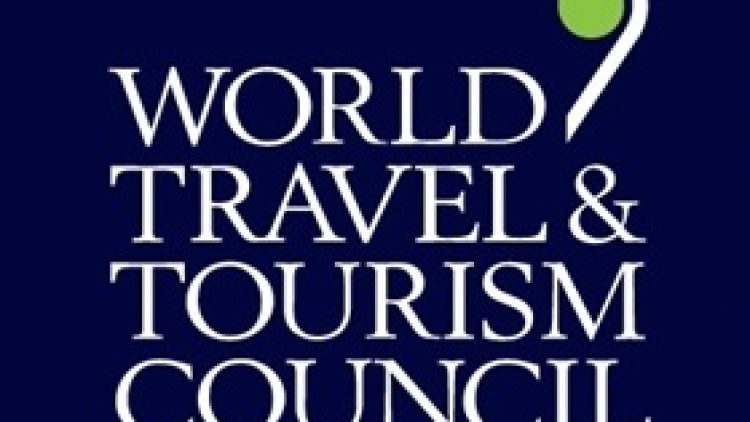
WTTC calls on travel industry to maximise power of technology on World Tourism Day to create jobs
Today, WTTC CEO & President Gloria Guevara joined Zurab Pololikashvili, Secretary-General, World Tourism Organization (UNWTO), and Csaba Domotor, State Secretary, Office of the Prime Minister, in the opening ceremony of the official UNTWO World Tourism Day celebration in Budapest, Hungary.
Today celebrates a sector that contributes 10.4% of the world’s GDP and generates 313 million jobs. In terms of GDP growth, the Travel & Tourism industry has outpaced the global economy by 4.6% for the seventh successive year. This year’s celebration brought together industry leaders and members of government to discuss Tourism and the Digital Transformation.
“I am grateful to my industry peers who have realised the impact of technology, and want to thank UNWTO Secretary-General Zurab Pololikashvili for prioritising this issue as we work together to harness innovation and digital advances.
“Technology has changed the way we travel and WTTC Members are powering travel. In one day, there are 15 million Uber rides, 15.2 million Trip Advisor visits, and 22.5 million visits to Expedia sites.
“Our industry needs to maximise the power of technology and innovation to increase the benefits of Travel & Tourism. By capitalising on this opportunity, we can create more jobs and ensure growth is sustainable and inclusive,” commented Guevara.
IATA reported 4.1 billion passengers were flown in 2017, a new record, with a promising forecast to reach 7.8 billion passengers by 2036 worldwide. At the same time, the UNWTO anticipates a rise in international visitor arrivals from 1.3 billion in 2017 to 1.8 billion by 2030. Travel & Tourism’s GDP grew 50% more than the world economy in 2017 at 4.6% and the projections indicate that Travel & Tourism will continue to outpace global economy growth in the future.
Guevara continued, “We have the potential to double the number of air passengers and increase the number of travellers around the world. Travel & Tourism is the best partner for growth, and our recently published Country Power and Performance report illustrates the economic impact our sector has on 185 countries.
“I am delighted to be in Hungary, where we have had a great opportunity to celebrate the hugely positive impact that our sector makes to the world. I look forward to seeing you in Seville, Spain at our 2019 Global Summit where WTTC will bring together Heads of Government, CEOs and Tourism Policymakers to raises awareness of the global, social and economic role of Travel & Tourism and debate the biggest challenges for our industry.”

US Virgin Islands sends message on World Tourism Day
The Commissioner of Tourism for the US Virgin Islands, Beverly Nicholson-Doty, sent this message on the occasion of World Tourism Day:
As we commemorate World Tourism Day, along with the United Nations World Tourism Organization (UNWTO), we celebrate what digital technology has done and can do for tourism.
Still fresh in our memory is last year’s experience when our Territory had to quickly reposition its marketing strategy after Hurricanes Irma and Maria.
Traditional communications as well as business and marketing strategies could not adequately meet the immediate challenges and rapidly changing dynamics of our recovery. This disruption to marketing as we had known it became an opportunity to create powerful experiences by utilizing modern digital platforms.
USVIupdate.com served as our informational gateway before, during and after the storms. It has now been transformed and serves as a go-to site for the latest developments in our post-Hurricane economy. Our social media channel also served as a hub to respond to questions, host interviews and send accurate, real-time information to our followers. These platforms allowed us to share our story with the world.
As small islands with limited tourism budgets to market our destinations, we need to continue being innovative and leverage the technologies at our disposal. This applies not just to government, but to the many hotels and businesses, who do not have the resources for major advertising campaigns. While digital advertising is not free, its affordability allows even the smallest business to compete on a global level.
Digital technology allows these very important movers in our economy, with numerous jobs dependent on them, to showcase their wares directly to potential visitors, to book them online, and handle their requests and queries. It allows them to keep abreast of the latest products and market information – and, at this time of the year, to track the weather forecasts.
We look forward to sharing the UNWTO’s findings on digital advances available for the industry across our respective government departments, our private sector and our educational institutions as we sharpen our skills and equip our young people for jobs and careers in this vital sector to our destination and our region.
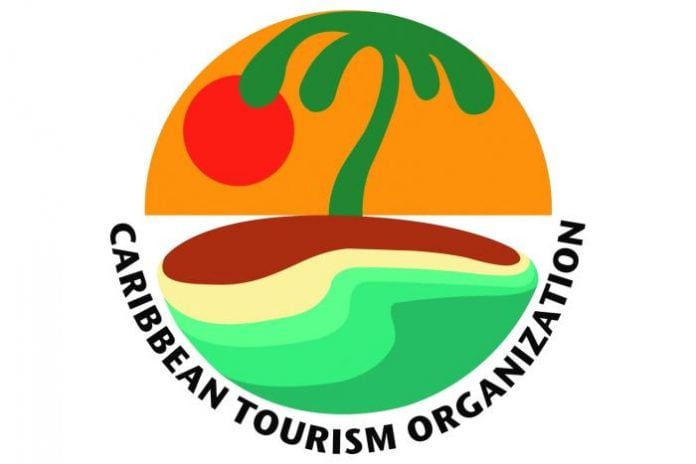
World Tourism Day 2018: Message from Caribbean Tourism Organization Secretary General
Hugh Riley, the Secretary General of the Caribbean Tourism Organization, issued the following statement on the celebration of World Tourism Day 2018, Wednesday, September 27, 2018:
The Caribbean Tourism Organization (CTO), the tourism development agency for the region, joins the global community today in celebrating World Tourism Day 2018 under the theme, ‘Tourism and the Digital Transformation’.
Digital advances have had a profound and transformative impact on our lives. They have influenced the way we learn, changed how we work, and altered the way humanity’s social fabric is connected. This behavioral evolution will continue; and in the travel and tourism business those who adapt will reap the rewards of technological innovation.
As the Caribbean’s primary foreign exchange earner, tourism remains the region’s lifeblood, contributing up to two-thirds of gross domestic product (GDP) in some cases. In order for the sector to drive continuous and inclusive growth in line with sustainable development goals, we must fully explore the economic, societal and environmental impacts of technology and innovation on tourism’s contribution to GDP.
The CTO is positioning Caribbean tourism to capitalize on emerging technologies. We’ve consulted with some of the foremost thought-leaders and are encouraging public and private sector investment in digital innovations that have disrupted traditional business models. It is our duty to our members to explore and introduce new tools and capabilities which alter the way we approach tourism marketing and development; and we must do so at all levels.
One of the best examples is our digital learning series of e-workbooks containing creatively designed audio visual and multi-lingual materials, designed to encourage and facilitate the teaching of tourism in Caribbean schools. Among other objectives the e-workbooks are meant to build greater awareness among young students regarding the significance of tourism to the Caribbean; demonstrate the importance of preserving our environment for ourselves and for our visitors; enlist the creativity of students to enhance tourism’s success; and showcase the full range of career opportunities tourism presents to Caribbean people.
Then there is the Tourism Information Management System (TIMS), an online application launched by the CTO in 2015 to capture, analyze and display tourism related data for the benefit of our members. This tool captures arrival and departure data from embarkation and disembarkation records via a business analytics system which illustrates the data in a more visual and comprehendible way, facilitating additional reporting and actionable insights.
With the launch of our Visitor Intelligence Database for Analytics (VIDA) in 2016, some CTO member states began to maximize returns on their marketing investment with the VIDA segmentation tool, utilizing postal codes to reveal rich data on the region’s visitor demographics.
Additionally, the CTO is actively collaborating with innovative and disruptive companies such as Airbnb, an online community marketplace that connects travellers with hosts in over 190 countries. Together with Airbnb, the CTO is assisting Caribbean tourism officials and stakeholders to maximize the benefits of the sharing economy, and home-sharing in particular. This work includes informing stakeholders of the value of peer-to-peer review mechanisms; providing economic analyses of Airbnb’s impact; developing policy guidelines and recommendations for the consideration of Caribbean lawmakers; exploring ways to make the sharing economy beneficial to our destinations while working in concert with all segments of the accommodation sector; and identifying ways to more effectively market the Caribbean as a region.
We are also working with Bitt, a financial technology company to develop ways of using blockchain technology and mobile money systems to the advantage of the tourism industry in the Caribbean. This work includes promoting the inclusion of micro, small and medium tourism enterprises; providing fast, simple and secure methods for visitors and locals to complete a wide range transactions; and assisting vendors and policymakers to improve data-processing and decision-making.
The CTO’s State of the Tourism Industry Conference (SOTIC) at Paradise Island, the Bahamas from 1-5 October, 2018, will feature a key session on ‘Modernizing the Experience: Using Technology to Enhance the Visitor Experience’. The discussion will cover a broad range of applications from customer-centric hospitality models leveraging technology, to the way industry leaders are using mobile and virtual reality innovations to differentiate brand identity.
In the coming months the CTO will continue to develop an agenda which encourages and assists member states’ efforts to create digitally-enhanced tourism services via entrepreneurship and innovation. It is our firm belief that more efficient resource management will empower our local communities and help build a truly inclusive tourism sector.
Tourism must bring benefits to all members of our society. Emerging digital technologies provide a range of new tools that can tackle challenges faced throughout our member states, increase profitability and bring about positive change for stakeholders that will improve the quality of life for all Caribbean people.

WTTC commends Japan on crisis preparedness in wake of Typhoon Jebi and Hokkaido earthquake
Speaking at the annual Tourism Expo on 20 September, hosted by the Japan Travel and Tourism Association (JTTA), Japan Association of Travel Agents (JATA) and the Japan National Tourism Organisation (JNTO), WTTC President and CEO Gloria Guevara applauded the Japanese Travel & Tourism sector on returning to business-as-usual so soon after Typhoon Jebi and the subsequent Hokkaido earthquake.
Typhoon Jebi and the Hokkaido earthquake caused great upheaval in early September, leaving tourists temporarily stranded as power outages disrupted day-to-day operations across the country.
Gloria Guevara commented, “The recovery process undertaken in Japan over recent weeks has been truly exemplary. Japan has minimised disaster damage through implementation of crisis preparedness measures and existing infrastructures that allowed authorities and services to return to business-as-usual more readily.”
Rapid recovery time is crucial to national economies given the importance of Travel & Tourism in providing jobs, investments and opportunities for economic growth. This is particularly true in Japan where the sector supports 4.2 million jobs (6.4%) and contributes 6.8% to GDP ($331.2bn). Last year, 28.3m visitors holidayed in or travelled to Japan, spending $35.3bn (4.1% of total exports).
While at the annual Tourism Expo, Ms. Guevara also commended Japan’s Travel & Tourism broader strategy, as codified in their ‘Tourism Vision Realisation Program’ in June 2018. The Program outlines plans for relaxing visa restrictions, developing public facilities, and introducing facial recognition technology to airports.
Such plans aim to sustain Japan’s place as a global tourism heavyweight. Japan’s Travel & Tourism sector is great and growing, currently positioned as the 4th largest T&T economy in the world. In terms of foreign visitor spending, Japan is second only to China.
Ms. Guevara remarked, “Japan has been at the helm of a unique and immensely successful tourism boom over the last five years, averaging a growth rate of 25.3% per year between 2013 and 2017. This record highlights the opportunities available to governments that plan for travel growth and embrace tourism-friendly policies.
“I am confident in Japan’s future as they have continuously demonstrated initiative to maximize the opportunities for growth in Travel & Tourism. With the Rugby World Cup, 2020 Olympics and G20 Summit in their midst, Japan has a real opportunity to attract even more visitors and investment, and WTTC supports the Japanese government in their target of 40 million international tourist arrivals by 2020.”
